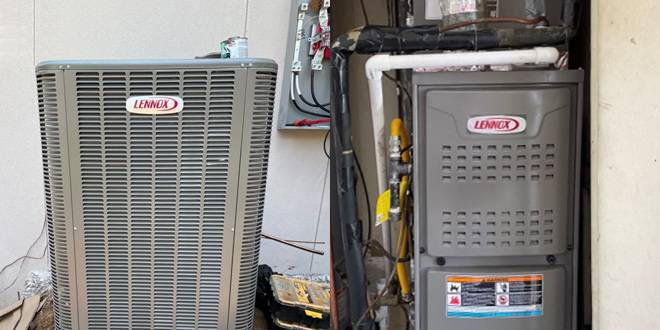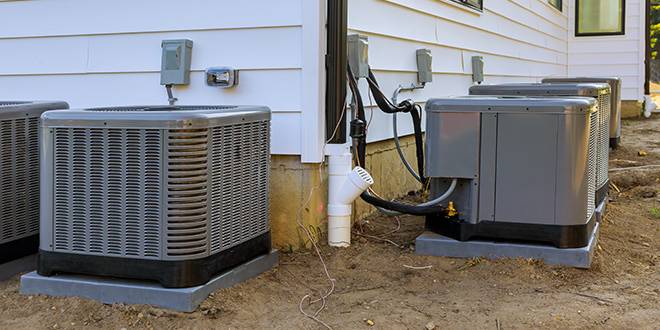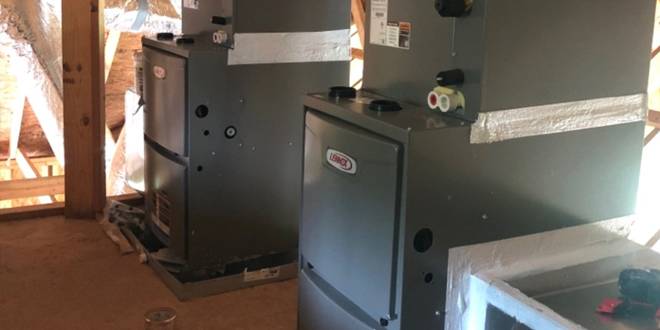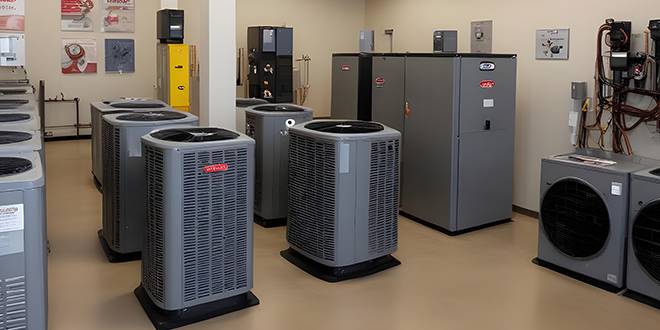
Glossary of Key Heating Terms
- Heat Pump: A device that transfers heat from outdoor air to heat your home in winter, reversing to cool it in summer.
- Furnace: A heating unit that generates heat through fuel combustion (gas or oil) or electricity.
- AFUE (Annual Fuel Utilization Efficiency): A measure of furnace efficiency, showing how much fuel converts to heat.
- COP (Coefficient of Performance): An efficiency rating for heat pumps that indicates how much heat they produce relative to energy consumed.
- Auxiliary Heat: Supplemental heat used by heat pumps in extremely cold weather to maintain indoor warmth.
- Ductwork: A system of tubes that distribute heated or cooled air throughout your home.
- Geothermal Heat Pump: A type of heat pump that uses the earth’s steady underground temperature for heating and cooling.
- Thermostat: A device used to control the temperature of your heating or cooling system.
Heat Pump vs. Furnace – Which is Best for Your Home?
When it comes to home heating, heat pumps and furnaces are two of the most popular choices. Each offers unique advantages and is better suited for specific climates and home needs. Whether you’re looking for an energy-efficient option, powerful heating in extreme cold, or a dual-purpose system, understanding the key differences between these two types of heating systems can help you choose the best one for your home.
This guide covers everything you need to know about heat pumps and furnaces, including how they work, efficiency, maintenance, costs, and environmental impact. And for those needing professional assistance, Cartwright Heat & Air provides installation, repair, and maintenance for both heat pumps and furnaces, ensuring your home stays comfortable all winter long.
How They Work: Heat Pumps vs. Furnaces
Heat Pumps
Heat pumps are unique in their ability to provide both heating and cooling, making them a versatile option for homeowners. In the winter, a heat pump extracts warmth from outdoor air and transfers it indoors. In summer, the process reverses, moving warm indoor air outside to keep your home cool. This is done using electricity, and because heat pumps move heat rather than generate it, they’re known for their efficiency.
Heat pumps are ideal for moderate climates where temperatures don’t frequently drop below freezing. In very cold regions, they may require auxiliary heating (typically electric resistance coils) to maintain warmth, which can reduce their efficiency slightly.

Furnaces
Furnaces are traditional heating systems that use fuel combustion (natural gas, oil, or propane) or electricity to generate heat. The furnace heats air directly, which is then circulated through the home’s ductwork to maintain a warm temperature. Furnaces are known for providing powerful, consistent heat, making them a preferred choice in colder climates.
Furnaces are rated by Annual Fuel Utilization Efficiency (AFUE), which tells you how much fuel converts to heat for your home. High-efficiency models achieve AFUE ratings up to 98%, meaning almost all the fuel is used for heating.

Cost Comparison: Installation and Operation
- Initial Cost:
- Heat Pumps: The initial cost of a heat pump is generally higher, but it offers both heating and cooling, potentially eliminating the need for a separate air conditioner.
- Furnaces: Furnaces typically have a lower upfront cost for heating alone, but they may require a separate AC unit for cooling.
- Operational Costs:
- Heat Pumps: Heat pumps are generally cost-effective in moderate climates, as they use electricity efficiently by transferring rather than generating heat.
- Furnaces: Operating costs for furnaces depend on fuel prices. Gas furnaces are often cheaper to run than electric models, but if a separate AC is needed, total energy costs may be higher.
- Maintenance Costs:
- Both heat pumps and furnaces require regular maintenance to ensure efficiency and longevity. Cartwright Heat & Air offers maintenance plans for both systems, including annual heating maintenance to keep costs down over time and extend the life of the system.
Efficiency and Performance: How They Compare
| Factor | Heat Pumps | Furnaces |
| Climate Suitability | Best for moderate to mild climates | Ideal for colder climates |
| Energy Efficiency | Highly efficient (COP rating) | High efficiency (AFUE rating) |
| Temperature Consistency | May need auxiliary heat in cold weather | Consistent high heat in cold weather |
| Lifespan | 15-20 years | 15-30 years, depending on type |
| Maintenance Needs | Regular filter and coil maintenance | Annual cleaning and inspection |
| Eco-Friendliness | Lower emissions, renewable heat option | Improved with high-efficiency models |
Environmental Impact and Efficiency
Heat pumps are considered one of the most environmentally friendly heating options because they use electricity to transfer heat, resulting in minimal emissions. This makes them a sustainable choice, especially when paired with renewable energy sources. In mild climates, heat pumps can operate with impressive efficiency, producing up to three times more heat than the energy they consume.
Furnaces, on the other hand, burn fuel to generate heat. Gas furnaces produce emissions, though high-efficiency models are much cleaner than older units. While furnaces aren’t typically as eco-friendly as heat pumps, modern high-efficiency gas furnaces are a good choice in colder climates where powerful heating is essential.

Pros and Cons of Heat Pumps vs. Furnaces
Heat Pumps
Pros:
- Dual heating and cooling capability
- High energy efficiency in moderate climates
- Lower emissions and eco-friendly
Cons:
- Less effective in extremely cold temperatures
- Higher initial cost
- May require auxiliary heating in severe cold
Furnaces
Pros:
- Strong, consistent heating in cold weather
- More cost-effective upfront for heating-only needs
- Long lifespan with proper maintenance
Cons:
- Higher emissions (for fuel-based furnaces)
- Separate AC unit may be needed for cooling
- May have higher operating costs depending on fuel prices
Fun Facts About Heat Pumps and Furnaces
- Heat Pumps Serve Dual Functions: They’re one of the few systems that can provide both heating and cooling, making them popular in areas with mild winters.
- Furnaces Have Ancient Roots: The earliest central heating systems, known as hypocausts, date back to ancient Rome and were used to warm public baths and villas.
- Geothermal Heat Pumps Are Extra Efficient: Using the earth’s consistent underground temperature, these systems are up to four times more efficient than traditional HVAC systems.
- Newer Furnaces are Safer: Advanced furnaces come with safety shut-offs and CO detectors, greatly reducing the risk of gas leaks.
FAQ: Choosing Between Heat Pumps and Furnaces
- Can a heat pump work effectively in very cold climates?
While heat pumps work in cold weather, they may struggle in extreme cold and could require auxiliary heating. - Are heat pumps quieter than furnaces?
Yes, heat pumps tend to be quieter than furnaces, especially compared to older furnace models. - What’s the lifespan of a heat pump compared to a furnace?
Heat pumps typically last 15-20 years, while furnaces, especially gas models, can last 20-30 years with good maintenance. - Which is more energy-efficient, a heat pump or a furnace?
Heat pumps are generally more efficient in moderate climates, while high-efficiency furnaces are ideal for extreme cold. - Is it possible to use both a heat pump and a furnace in one home?
Yes! Many homeowners use a hybrid system, where the heat pump provides warmth in mild weather, and the furnace kicks in when temperatures drop. - What maintenance is required for each system?
Heat pumps need regular filter changes and coil cleaning. Furnaces benefit from annual cleanings and inspections to ensure safe operation.
Quiz: Is a Heat Pump or Furnace Right for You?
- Do you live in a region with very cold winters?
- Yes ⬜ No ⬜
- Is energy efficiency a top priority?
- Yes ⬜ No ⬜
- Would you like a system that provides both heating and cooling?
- Yes ⬜ No ⬜
- Is reducing your environmental impact important to you?
- Yes ⬜ No ⬜
- Do you prioritize long-term savings over lower initial costs?
- Yes ⬜ No ⬜
If you answered “Yes” to more than three of these questions, a heat pump may be the best choice for you. If not, a furnace might be the better fit. For personalized recommendations, contact Cartwright Heat & Air for expert guidance.
Making the Right Choice with Cartwright Heat & Air
Choosing between a heat pump and a furnace depends on your climate, energy efficiency goals, and budget. Whether you need a powerful furnace for extreme winters or a versatile heat pump for mild climates, Cartwright Heat & Air is here to help. Our team provides expert installation, repair, and maintenance services to ensure your system meets your heating needs.
For more information or personalized recommendations, contact us today and discover the best heating solution for your home.








